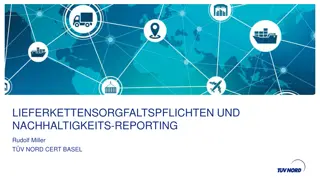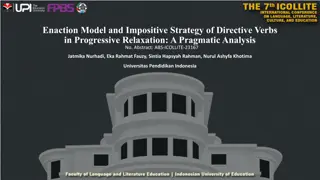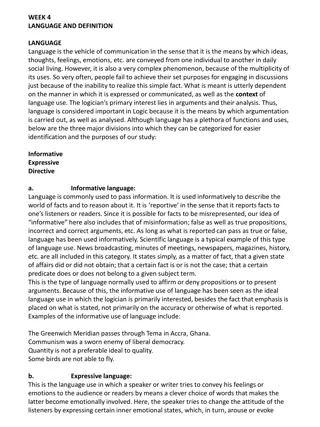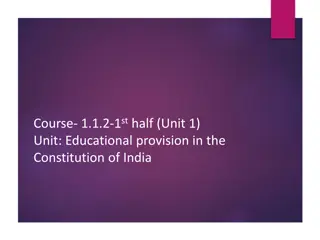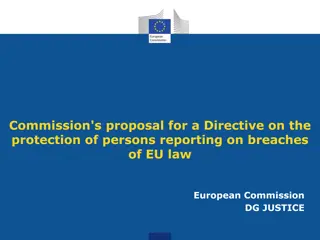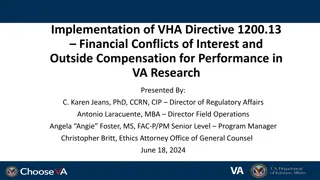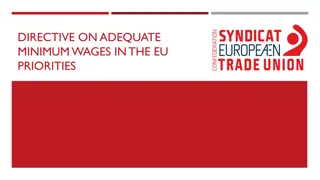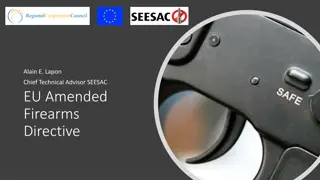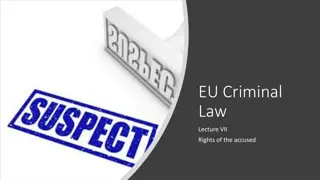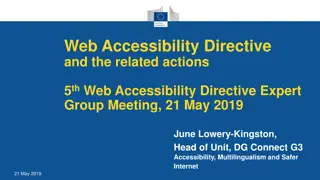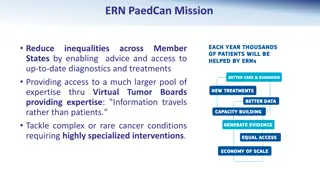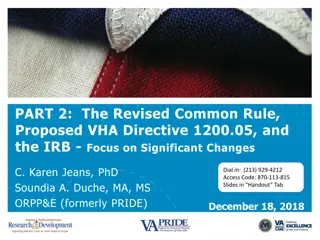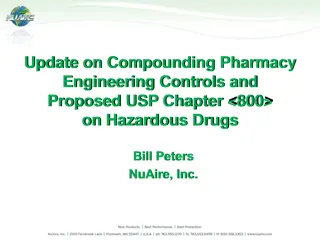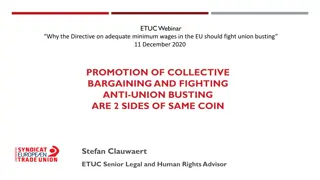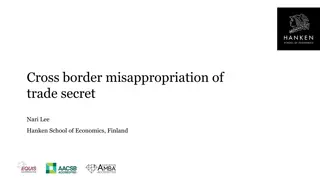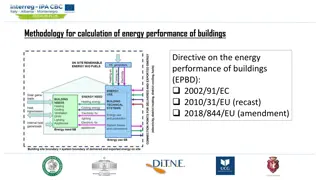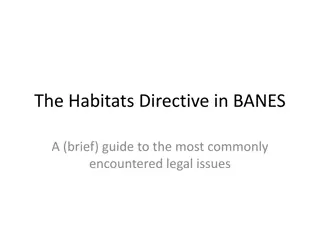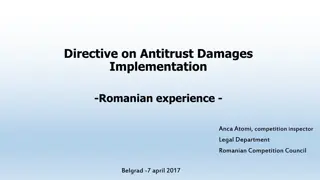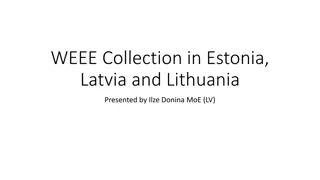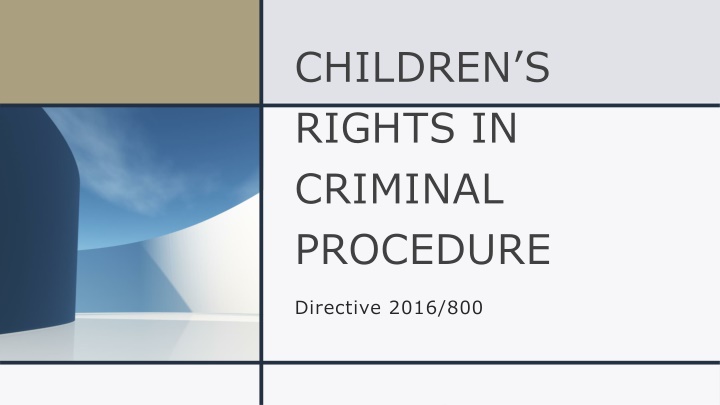
Children's Rights in Criminal Procedure: Understanding Juvenile Justice and Age of Criminal Responsibility in Europe
Explore the complexities of children's involvement in criminal procedures, including the differences in age of criminal responsibility across Europe. Learn about juvenile justice systems, legal interventions for young offenders, and specialized laws to protect children's interests in custodial disputes.
Download Presentation

Please find below an Image/Link to download the presentation.
The content on the website is provided AS IS for your information and personal use only. It may not be sold, licensed, or shared on other websites without obtaining consent from the author. If you encounter any issues during the download, it is possible that the publisher has removed the file from their server.
You are allowed to download the files provided on this website for personal or commercial use, subject to the condition that they are used lawfully. All files are the property of their respective owners.
The content on the website is provided AS IS for your information and personal use only. It may not be sold, licensed, or shared on other websites without obtaining consent from the author.
E N D
Presentation Transcript
CHILDRENS RIGHTS IN CRIMINAL PROCEDURE Directive 2016/800
Child as an accused in criminal procedure Children crime same manner as adults? may should also be the perpetrators be of a but punish at the
Juvenile justice, system of laws, policies, and procedures intended to regulate the processing and treatment of nonadult violations of law and to provide legal remedies that protect their interests conflict or neglect. Punishable offenses that are classified as criminal offenses for adults are committed by juveniles, offenses mandating legal intervention only are referred to as status offenses. offenders for Child as an accused in criminal procedure in situations of referred to as delinquency whereas when juvenile Children are also subject to specialized laws, procedures, and policies designed to protect their interests when parents or other legal guardians involved in custodial disputes. are unavailable, negligent, or
https://archive.crin.org/en/home/ages/europe. html There are no common standards in Europe or the EU on the age of criminal responsibility. The age varies from 10 years old in Northern Ireland and the UK to Scandinavian countries and e.g. Poland. Age of criminal responsibili ty 16/17 years old in Italy - Children under the age of 14 cannot be held persons aged 14 to 17 (inclusive) can only be held criminally liable where judged criminal intent in relation offence criminally liable for any offence and they the to have necessary the specific been capable of forming
Portugal - Persons under the age of 16 cannot be held Age of criminal responsibili ty criminally liable. Persons aged between 12 and 16 can be subject to penalties under the Guardianship and Education Law, which allows for the detention of children in closed educational centres. [Criminal Code, Article 19; Lei Tutelar Educativa 1999 (Guardianship and Education Law), Articles 1 and 4]
https://eu.usatoday.com/story/opinion/polici ng/spotlight/2019/05/29/juvenile-justice- infant-death-10-year-old/1225469001/ Children as a perpetrator s https://en.wikipedia.org/wiki/Murder_of_Jam es_Bulger https://eu.amarillo.com/story/news/nation- world/2012/10/22/11-year-old-accused- maine-baby-death-arraigned/13110462007/
Different/separate proceedings were created especially commited a crime before achieving the age of criminal responsibility welfare model Systems/m odels of criminal proceedings fof juvenile for young perpetrators if they After responsibility - additional/special guarantees in criminal proceedings achieving the age of criminal There is also a trend allowing more lenient punishment for young adults (people up to 21 years old)
For the purposes of this recommendation: Recommendation Rec (2003)20 of the Committee of Ministers to member states concerning new ways of dealing with juvenile delinquency and the role of juvenile justice - juveniles means persons who have reached the age of criminal responsibility but not the age of majority; however, this recommendation may also extend to those immediately below and above these ages; - delinquency means actions which are dealt with under criminal law. In some countries antisocial and/or deviant behaviour which may be dealt with under administrative or civil law; it also extends to - component of a wider approach for tackling youth crime. In addition to the youth court, it encompasses official bodies or agencies such as the police, the prosecution service, the legal profession, the probation service and penal institutions. It works closely with related agencies such as health, education, social and welfare services and non-governmental bodies, such support. juvenile justice system is defined as the formal as victim and witness
Recommendation Rec (2003)20 of the Committee of Ministers to member states concerning new ways of dealing with juvenile delinquency and the role of juvenile justice 1. and associated measures for tackling juvenile delinquency should be: The principal aims of juvenile justice i. to prevent offending and re-offending; ii. to (re)socialise and (re)integrate offenders; and iii. victims. to address the needs and interests of
The purpose of this Directive is to establish procedural children, meaning persons under the age of 18, who are suspects or accused persons in criminal understand and follow those proceedings and to exercise their right to a fair trial, and to prevent children from re-offending and foster their social integration. safeguards to ensure that Directive 2016/800 proceedings, are able to
Although the Member States are parties to the European Convention for the Protection of Human Rights and Fundamental Freedoms (ECHR), the International Covenant on Civil and Political Rights, and the UN Convention on the Rights of the Child, experience has shown that this in itself does not always provide a sufficient degree of trust in the criminal justice systems of other Member States. Directive 2016/800
(11) should also apply to suspects or accused persons in criminal proceedings, and who were children when they became subject to the reached the age of 18, and where the application of this Directive is appropriate in the light of all the circumstances of the case, including the maturity and vulnerability of the person concerned. This Directive, or certain provisions thereof, to requested persons, Directive 2016/800 proceedings, but who have subsequently
(12)When, at the time a person becomes a suspect or person has reached the age of 18, but the criminal offence was committed when the person was a child, Member States are encouraged procedural Directive until that person reaches the age of 21, at committed by the same suspect or accused person and that are jointly investigated and prosecuted as they are inextricably linked to criminal proceedings which were initiated against that person before the age of 18. accused person in criminal proceedings, that to apply by the this Directive 2016/800 safeguards provided for least as regards criminal offences that are
This Directive should not apply in respect of certain minor offences. However, it should apply where a child who is a suspect or accused person is deprived of liberty. Directive 2016/800 This proceedings. It should not apply to other types of proceedings, in particular proceedings which are specially designed for children and which could lead measures. Directive should apply only to criminal to protective, corrective or educative
Confidentiality of communication between children and their lawyer is key to ensuring the effective exercise of the rights of the defence and is an essential part of the right to a fair trial. Member States should therefore respect the confidentiality of meetings and other forms of communication between the lawyer and the child in the context of the assistance by a lawyer provided for in this Directive, without derogation. This Directive is without prejudice to procedures that address the situation where there are objective and factual circumstances giving rise to the suspicion that the lawyer is involved with the child in a criminal offence. Any criminal activity on the part framework of this Directive. The obligation to respect confidentiality not only implies that Member States refrain from interfering with, or accessing, such communication but also that, where children are deprived of liberty or otherwise find themselves in a place under the control of the State, Member States ensure that arrangements for communication uphold and protect such confidentiality. This is without prejudice to any mechanisms that are in place in detention facilities with the purpose of avoiding illicit enclosures being sent to detainees, such as screening correspondence, provided that such mechanisms do not allow the competent authorities to read the communication between children and their lawyer. This Directive is also without prejudice to procedures under national law according to which forwarding correspondence may be rejected if the sender does not agree to the correspondence first being submitted to a competent court. of a lawyer should not be considered to be legitimate assistance to children within the
Definitions Article 3 Definitions For the purposes of this Directive the following definitions apply: (1) child means a person below the age of 18; (2) holder of parental responsibility means any person having parental responsibility over a child; (3) parental responsibility means all rights and duties relating to the person or the property of a child which are given to a natural or legal person by judgment, by operation of law or by an agreement having legal effects, including rights of custody and rights of access. With regard to point (1) of the first paragraph, where it is uncertain whether a person has reached the age of 18, that person shall be presumed to be a child.
Right to information (a) promptly when children are made aware that they are suspects or accused persons, in respect of: (i) the right to have the holder of parental responsibility informed, as provided for in Article 5; (ii) the right to be assisted by a lawyer, as provided for in Article 6; (iii) the right to protection of privacy, as provided for in Article 14; (iv) the right to be accompanied by the holder of parental responsibility during stages of the proceedings other than court hearings, as provided for in Article 15(4); (v) the right to legal aid, as provided for in Article 18;
Right to information (b) at the earliest appropriate stage in the proceedings, in respect of: (i) the right to an individual assessment, as provided for in Article 7; (ii) the right to a medical examination, including the right to medical assistance, as provided for in Article 8; (iii) the right to limitation of deprivation of liberty and to the use of alternative measures, including the right to periodic review of detention, as provided for in Articles 10 and 11; (iv) the right to be accompanied by the holder of parental responsibility during court hearings, as provided for in Article 15(1); (v) the right to appear in person at trial, as provided for in Article 16; (vi) the right to effective remedies, as provided for in Article 19;
Individual assessment Article 7 Right to an individual assessment 1. education, training and social integration are taken into account. Member States shall ensure that the specific needs of children concerning protection, 2. be individually assessed. The individual assessment shall, in particular, take into account the child's personality and maturity, the child's economic, social and family background, and any specific vulnerabilities that the child may have. For that purpose children who are suspects or accused persons in criminal proceedings shall 3. of the case, the measures that can be taken if the child is found guilty of the alleged criminal offence, and whether the child has, in the recent assessment. The extent and detail of the individual assessment may vary depending on the circumstances past, been the subject of an individual
Individual assessment Article 7 Right to an individual assessment 4. recording procedure in the Member State concerned, such information about the individual characteristics authorities when: The individual assessment shall serve to establish and to note, in accordance with the and circumstances of the child as might be of use to the competent (a) determining whether any specific measure to the benefit of the child is to be taken; (b) assessing the appropriateness respect of the child; and effectiveness of any precautionary measures in (c) taking any decision or course of action in the criminal proceedings, including when sentencing.
Individual assessment Article 7 Right to an individual assessment 5. proceedings and, subject to paragraph 6, before indictment. The individual assessment shall be carried out at the earliest appropriate stage of the 6. presented assessment is in any event available at the beginning of the trial hearings before a court. In the absence of an individual assessment, an indictment may nevertheless be provided that this is in the child's best interests and that the individual 7. child. They shall be carried out by qualified personnel, following, as far as possible, a multidisciplinary responsibility, or another appropriate adult as referred to in Articles 5 and 15, and/or a specialised professional. Individual assessments shall be carried out with the close involvement of the approach and involving, where appropriate, the holder of parental
Individual assessment Article 7 Right to an individual assessment 8. significantly, Member States shall ensure that the individual assessment is updated throughout the criminal proceedings. If the elements that form the basis of the individual assessment change 9. individual circumstances of the case, provided that it is compatible with the child's best interests.. Member States may where derogate such from a the obligation to carry out in an the assessment derogation is warranted
Article 9 Audiovisual recording of questioning 1. law enforcement authorities during the criminal proceedings is audio-visually recorded where this is proportionate in the circumstances of the case, taking into account, inter alia, whether a lawyer is present or not and whether the child is deprived of liberty or not, provided that the child's best interests are always a primary consideration. Member States shall ensure that questioning of children by police or other 2. another appropriate manner, such as by written minutes which are duly verified. In the absence of audiovisual recording, questioning shall be recorded in 3. the sole purpose of the identification of the child without audiovisual recording. This Article shall be without prejudice to the possibility to ask questions for
Article 10 Limitation of deprivation of liberty 1. proceedings is limited to the shortest appropriate period of time. Due account shall be taken of the age and individual situation of the child, and of the particular circumstances of the case. Member States shall ensure that deprivation of liberty of a child at any stage of the 2. shall be imposed on children only as a measure of last resort. Member States shall ensure that any detention is based on a reasoned decision, subject to judicial review by a court. Such a decision shall also be subject to periodic review, at reasonable intervals of time, by a court, either ex officio or at the request of the child, of the child's lawyer, or of a Member States shall ensure that decisions to be taken pursuant to this paragraph are taken without undue delay. Member States shall ensure that deprivation of liberty, in particular detention, judicial authority which is not a court. Without prejudice to judicial independence,
Article 14 Right to protection of privacy 1. proceedings is protected. Member States shall ensure that the privacy of children during criminal 2. children are usually held in the absence of the public, or allow courts or judges to decide to hold such hearings in the absence of the public. To that end, Member States shall either provide that court hearings involving 3. referred to in Article 9 are not publicly disseminated. Member States shall take appropriate measures to ensure that the records 4. and freedom and pluralism of the media, encourage the media to take self-regulatory measures in order to achieve the objectives set out in this Article. Member States shall, while respecting freedom of expression and information,
Gale Hawthorne was arrested for stealing bread, oil, tea, coffee, sugar and other supply from the store. When the shop owner noticed the theft, he became angry. arrived at the store. Although he tried to help Gale, it did not change the situation. Shortly after, the Guardian of the Peace Case study Gale was transferred to the police station. Since he didn't establish his age. have any documents, it was difficult to
1. If there are no documents determine available someone's and age, it what is impossible presumption should the police authority make? to Case study 2. What are the rights of arrested child?
The lawyer was not provided to Gale because the public prosecutor decided that the circumstances of the case were clear, and there was no need to involve another person in the process. The Gale, who decided to remain silent but asked to inform his mother of the arrest. After the statement about exercising prosecutor decided that there was no need to create a protocol or record the interrogation. Shortly after, the act of indictment was issued to the court. prosecutor interrogated Case study the right to remain silent, the public
1. How prosecutor? do you assess the activity of the public Case study 2. Was his action in accordance with the directive?

